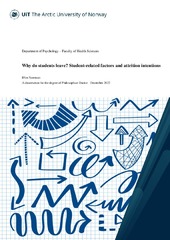| dc.contributor.advisor | Svartdal, Frode | |
| dc.contributor.author | Nemtcan, Efim | |
| dc.date.accessioned | 2023-05-31T10:22:24Z | |
| dc.date.available | 2023-05-31T10:22:24Z | |
| dc.date.issued | 2023-06-20 | |
| dc.description.abstract | Established as a collection of scholars protecting their shared interests, higher education has become a driving force of economic development accountable to the government and society. However, changes in higher education have been accompanied by multiple challenges, including funding and quality assessment. This dissertation addresses one of these challenges facing academic institutions, academic attrition. Although much research has been conducted on the issue of why students leave education, we don't yet know enough about how students' beliefs and perceptions, study behaviors, and difficulties are related to their decisions to leave. The present dissertation aims to facilitate the current research by investigating student-related factors and mechanisms involved in academic attrition.
An important issue in research on academic attrition is the variability of the phenomenon and the difficulty in putting available research into practice. The first two papers addressed the relevance of the distinction between different types of attrition intentions and involved self-regulated learning mechanisms. In the first paper, three categories of attrition intentions were investigated: leaving permanently, changing university, and changing study field. A particular focus has been placed on time management skills, self-efficacy, and student integration in explaining students' attrition intentions. The results showed that academic self-efficacy (i.e., student-related factor) was stronger related to attrition intentions than traditionally considered aspects of students' integration. The second paper addressed a similar question. However, compared to the first paper, the focus was directed toward the role of academic procrastination in explaining attrition intentions. Results showed a significant relationship between procrastination and all three categories of students' intentions. In sum, both papers support the importance of the distinction between different categories of attrition intentions and the relevance of looking at attrition from a student perspective. Finally, in the third paper, we investigated mechanisms that may be important in explaining and reducing procrastination. The results of the study showed that academic self-efficacy was an important mediator of the study skills-procrastination relationship. Taken together, the present results might have implications for future research developing assistance programs and universities aiming to reduce academic attrition. | en_US |
| dc.description.doctoraltype | ph.d. | en_US |
| dc.description.popularabstract | Students leaving higher education before completing a degree represent a serious problem for universities across Europe and may have negative consequences for students themselves. Leaving university is not exclusively negative, as in the case of Bill Gates or Steve Jobs, and cannot be easily reduced by the university when students report family or health reasons for leaving. However, policymakers and universities should address dropouts related to study experience. Furthermore, it is important to distinguish between different forms of dropout. We collected self-report data on students’ intentions to drop out, transfer to another university, and change study majors. The results showed that students with poor study time management skills reported more intentions to leave. However, this relationship was stronger for intentions of leaving university altogether than transferring to another university or changing study majors. We also addressed the practice of teaching study skills to students. Results demonstrated that students’ beliefs in their abilities to use these competencies – self-efficacy beliefs – might be necessary for making students use such skills adequately. Further, we found that a similar conclusion applies when addressing students’ irrational delay of academic tasks or procrastination. These results are important since we also found that procrastination may be involved in the dropout problem. In general, this doctoral work, showing the importance of looking at different types of leaving and alternative ways of addressing the problem or assisting students, might be helpful in future research and university practice. | en_US |
| dc.identifier.uri | https://hdl.handle.net/10037/29284 | |
| dc.language.iso | eng | en_US |
| dc.publisher | UiT The Arctic University of Norway | en_US |
| dc.publisher | UiT Norges arktiske universitet | en_US |
| dc.relation.haspart | <p>Paper 1: Nemtcan, E., Sæle, R.G., Gamst-Klaussen, T. & Svartdal, F. (2020). Drop-out and transfer-out intentions: The role of socio-cognitive factors. <i>Frontiers in Education, 5</i>, 273. Also available in Munin at <a href=https://hdl.handle.net/10037/29283>https://hdl.handle.net/10037/29283</a>.
<p>Paper 2: Nemtcan, E., Sæle, R.G., Gamst-Klaussen, T., & Svartdal, F. (2022). Academic self-efficacy, procrastination, and attrition intentions. <i>Frontiers in Education, 7</i>, 768959. Also available in Munin at <a href=https://hdl.handle.net/10037/26731>https://hdl.handle.net/10037/26731</a>.
<p>Paper 3: Svartdal, F., Grøm-Sæle, R., Dahl, T.I., Nemtcan, E. & Gamst-Klaussen, T. (2021). Study habits and procrastination: The role of academic self-efficacy. <i>Scandinavian Journal of Educational Research, 66</i>(7), 1141-1160. Also available in Munin at <a href=https://hdl.handle.net/10037/23500>https://hdl.handle.net/10037/23500</a>. | en_US |
| dc.rights.accessRights | openAccess | en_US |
| dc.rights.holder | Copyright 2023 The Author(s) | |
| dc.rights.uri | https://creativecommons.org/licenses/by-nc-sa/4.0 | en_US |
| dc.rights | Attribution-NonCommercial-ShareAlike 4.0 International (CC BY-NC-SA 4.0) | en_US |
| dc.subject | VDP::Samfunnsvitenskap: 200::Psykologi: 260::Kognitiv psykologi: 267 | en_US |
| dc.subject | VDP::Social science: 200::Psychology: 260::Cognitive psychology: 267 | en_US |
| dc.title | Why do students leave? Student-related factors and attrition intentions | en_US |
| dc.type | Doctoral thesis | en_US |
| dc.type | Doktorgradsavhandling | en_US |


 English
English norsk
norsk
